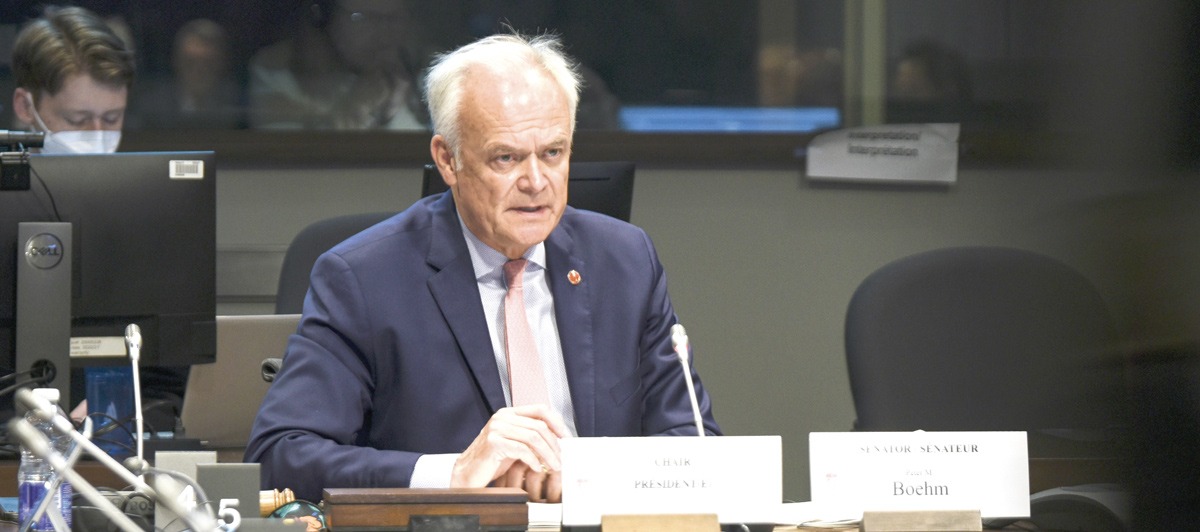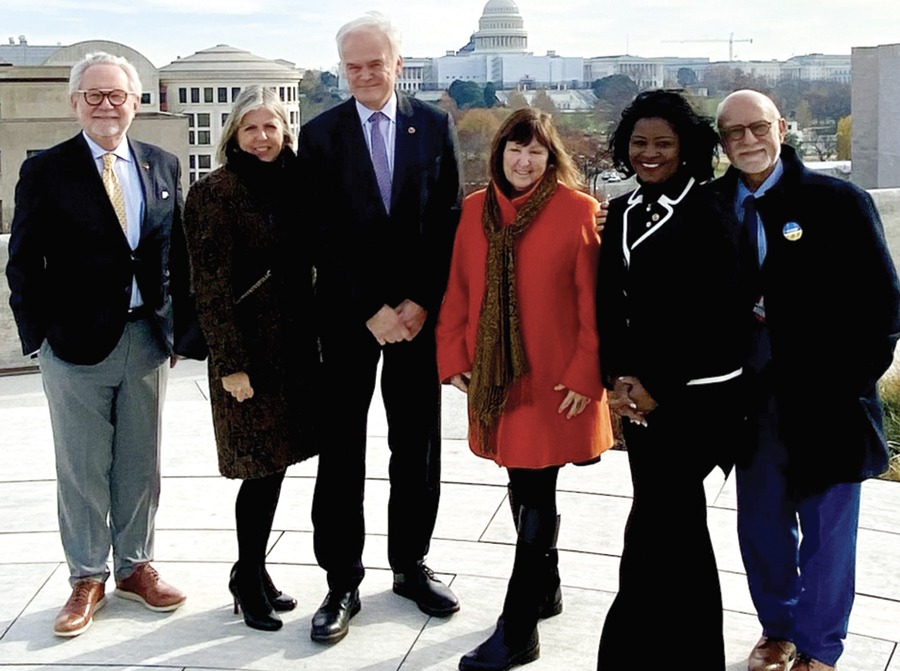Policy Q&A with Senator Peter Boehm: Is Canada’s Foreign Service ‘Fit for Purpose’?

There may be few people in Canada who can match Senator Peter Boehm’s knowledge of both sides of Canadian diplomacy — the practice of diplomacy as managed engagement with the rest of the world and the complexities of the Ottawa head office that oversees that engagement. Boehm served as Canada’s Sherpa for seven G7s, as Ambassador to Germany, as Ambassador to the Organization of American States, as Deputy Minister of International Development, Associate Deputy Minister of Foreign Affairs, as Assistant Deputy Minister for the Americas, North America and Consular Affairs, as Minister (political and public affairs) at the Canadian Embassy in Washington and in a variety of earlier diplomatic positions, including assignments in Cuba and Costa Rica.
In his current role as chair of the Standing Senate Committee on Foreign Affairs and International Trade (AEFA), Peter Boehm is overseeing the committee’s study on “the Canadian foreign service and elements of the foreign policy machinery within Global Affairs Canada. In simple terms, an exploration of whether Canada’s foreign service is fit for purpose in the 21st century. The committee is expected to report in spring 2023.
Policy magazine Associate Editor Lisa Van Dusen had the following exchange with Senator Boehm by email:
Lisa Van Dusen: At a time when it seems we may need diplomacy more than ever, it’s been besieged by many of the same issues governments are grappling with more broadly — the impact of technology, institutional fragmentation, the post-9/11 rise of the intelligence community, the ongoing challenge by autocracies to the rules-based international order of which diplomacy and multilateralism are key features…how do you see this moment for diplomacy in existential terms?
Senator Peter Boehm: Whether during multilateral negotiations or being present on a posting at an embassy, diplomacy is first and foremost human interaction undertaken on behalf of state actors. The digital revolution has changed it. So, one could argue, did the pandemic. When I began my career as a foreign service officer, my messages and reports were written in longhand and then encrypted. As I continued, we graduated to desktop computers, followed by BlackBerries, iPads and iPhones by the time I retired. The pandemic brought us Zoom, Teams and other virtual platforms. This type of interaction worked to a point — even leaders used it effectively — and there was no carbon footprint and heavy travel cost. Yet the missing ingredient was the opportunity to go into a corner with someone to garner support for a position, work out a compromise or build an alliance among others to counter a position inimical to our interests. The challenges are great but our “tradecraft” has somehow kept pace: whether through a closer and more realistic collaboration between intelligence communities and the diplomats (post-9/11 as you suggest) or dealing with direct threats, often powered by disinformation on social media, that could negatively impact the rules-based international order that has been with us, with some modifications, since the end of World War II. And that is the over-arching objective of our Senate study: to underscore the importance of a modern and engaged foreign, international trade and development ministry for a country like ours that has global reach, interests and presence. I think the fact that, in May, Minister Mélanie Joly launched an internal departmental study on the future of diplomacy was a welcome development as it also seeks to address these challenges. I suspect our two studies have much in common and that they are complementary. Our committee visited Washington at the beginning of December and the Americans are well into State Department modernization at all levels. The British, Germans and Nordics are also engaged in exercises designed to make their foreign ministries and diplomatic services abroad fit the current zeitgeist. France is also doing so, but has taken a more radical approach to staffing and career development. This might be a global moment for foreign service adjustment.
LVD: While your AEFA study of the foreign service is still underway, can you give Policy readers a sense of the broad themes that have emerged, including any issues that may have surprised you?
SPB: In essence, the themes are the same that were addressed in 1981 in the Royal Commission on Conditions of Foreign Service, led by Pamela McDougall. They include recruitment, employment and retention; spousal employment abroad and duty of care for all staff; how to attract the proverbial “best and brightest” to serve their country; how to improve the framework (The Foreign Service Directives) that supports the efforts of Canadian personnel abroad when dealing with living in challenging locations, often accompanied by family members; assessing the concept of “rotationality,” which is to say striking that balance for the individual between years abroad and at headquarters but also the ratio of positions abroad against those in Ottawa. In their own review, the British have called for “more foreign, less office”. To that, add the importance and human resource management of our locally-engaged staff abroad, the backbone of all our missions. Effective training, particularly in difficult foreign languages, critical technology and cybersecurity has taken on a greater sense of urgency in today’s world. We all would do well to have mentors who can show us the ropes of diplomacy while reassuring us that we are on the right path. Management, departmental culture and “identifying/managing the talent” (promotion and secondment processes) are vital to the success of any organization. What is now Global Affairs Canada was the Department of External Affairs when I joined, which begat DFAIT when international trade was added in 1981, and DFATD in 2013 when CIDA was amalgamated. Also, there is greater inter-departmental and agency coordination on international affairs than ever before because of the need to have specialist engagement on migration, environment, policing, defence and intelligence issues to name but a few. So, the specialist versus generalist argument is another enduring discussion item. But the big, newer theme is whether the foreign service effectively represents in person and culture the diverse country that Canada has become. One statistic that stands out to me is that the average age of a foreign service officer below management or executive rank today is 47. I joined the foreign service in my twenties and enjoyed the good fortune of a long career path. This average in my view reflects inconsistent recruitment, lack of planning and suggests that talent could be better managed. However, on the positive side, that number is also significant in that, as of last summer, 47 percent of Canada’s ambassadors, high commissioners and consuls general abroad were women. Moving forward on diversity does not, however, stop there. While good progress has been made in seeing our country’s diversity reflected among officers at the working level, including in intersectional aspects, it should also be visible among senior management and heads of mission. Personally, I would like to see more indigenous representation in the ranks.

LVD: This is such a huge endeavour — as you said, no similar study has been done since 1981. What has that looked like in practical terms?
SPB: Since April 7, 2022, when we began meeting on this study, the Committee has held ten meetings on the subject and heard from 32 witnesses; we will hold one more on December 15, the last before Parliament’s winter recess. The witnesses so far have included ministers, deputy ministers, former diplomats and deputy ministers, senior representatives from other government departments and agencies, academics, union representatives and members of the Global Affairs Canada Young Professionals Network. There will be more witnesses to come. At our request, the department has provided us with important statistical data on the workforce, its demography and trends on the balance between positions at headquarters and abroad, the personnel categories or streams (political/economic, trade, international assistance, administrative/consular, information/technology, administrative assistant, locally-engaged staff). We have a lot of data to sift through and analyze. Our trip to Washington provided us with not just the State Department’s perspective on modernization but also that of members of the Senate Foreign Relations Committee who, like us, are overseeing such efforts and, in their case, are appropriating the funds to effect change. We will also seek to compare renewal efforts being undertaken by other governments.
LVD: One of the briefs submitted for the AEFA study was from a former foreign service officer whose romantic notions of seeing the world on a diplomatic passport had been, if not shattered, at least somewhat deflated. If you were leaving the University of Edinburgh today with your PhD in history, would you take the foreign service exam?
SPB: Indeed, I would take the exam. I had written it twice and realized that a foreign service career became the option when my attempts at getting a university teaching job did not bear fruit. Whether I would pass it as it is presently constituted and advance to the interview stage is a different matter altogether. At the moment, and for some time now, it is a different exam with an emphasis on cognitive problem solving. I was encouraged to see that the exam is again being offered, hopefully on a more regular basis and with an effort to “onboard” officers more quickly. The fact that there are members of different occupational groups (FS, EC, ES, PM) essentially doing the same work at headquarters but not all being able to compete for positions abroad can put romantic notions of diplomatic service to rest fairly quickly. New officers are arriving now with a remarkable skillset, very much attuned to today’s global challenges and requirements. Some say they will try the foreign service for a few years and see how it goes since, as ever, important life choices also come into play. And if you are fortunate, you get to work on exciting policy and operational files, see fascinating places, appreciate your own country as you are in its service and learn a lot about yourself. I have no regrets.
Senator Peter Boehm, a regular contributor to Policy magazine, is a former senior diplomat and current chair of the Standing Senate Committee on Foreign Affairs and International Trade. He served as Canada’s Sherpa for seven G7 summits.
Policy Magazine Associate Editor Lisa Van Dusen was a senior writer at Maclean’s, Washington columnist for the Ottawa Citizen and Sun Media, international writer for Peter Jennings at ABC News and an editor at AP National in New York and UPI in Washington.
